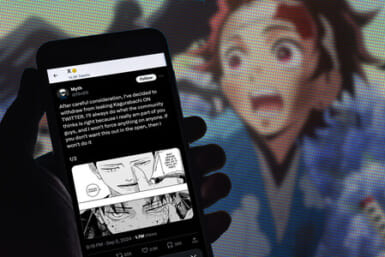A Permanent Gag Order
To be a star in Japan, finding a talent agency – and signing away your freedom – may be the only way to reach your dreams. Is it a price worth paying?
For many it can be too tempting an offer to turn down: Sign with a talent agency and you could be on the front cover of Vogue, perform live in front of thousands, or possibly feature in big-budget movies. The appeal is obvious, yet behind the glitz and glamor things aren’t always as they seem, especially here in Japan.
The entertainment industry in this country has a dark underbelly, which you hear about in rumors of power harassment, sexual assault and other criminal activities. Celebrities are rarely given freedom to express themselves and in many cases are effectively seen as the property of agencies, with no power or control over their careers. Voicing an opinion can also be problematic. For popular actor Takumi Saitoh, it’s one of the most frustrating aspects of his profession.
“If you say something too controversial you might get your manager in trouble so that’s something to avoid,” he recently told Weekender. “It’s hard. There are lots of issues I’d like to write about for my blog, but I know there’s a limit to what I can say. I’ve spoken to actors in America who have the freedom to criticize, protest and speak about elections. We’re not able to do that.”
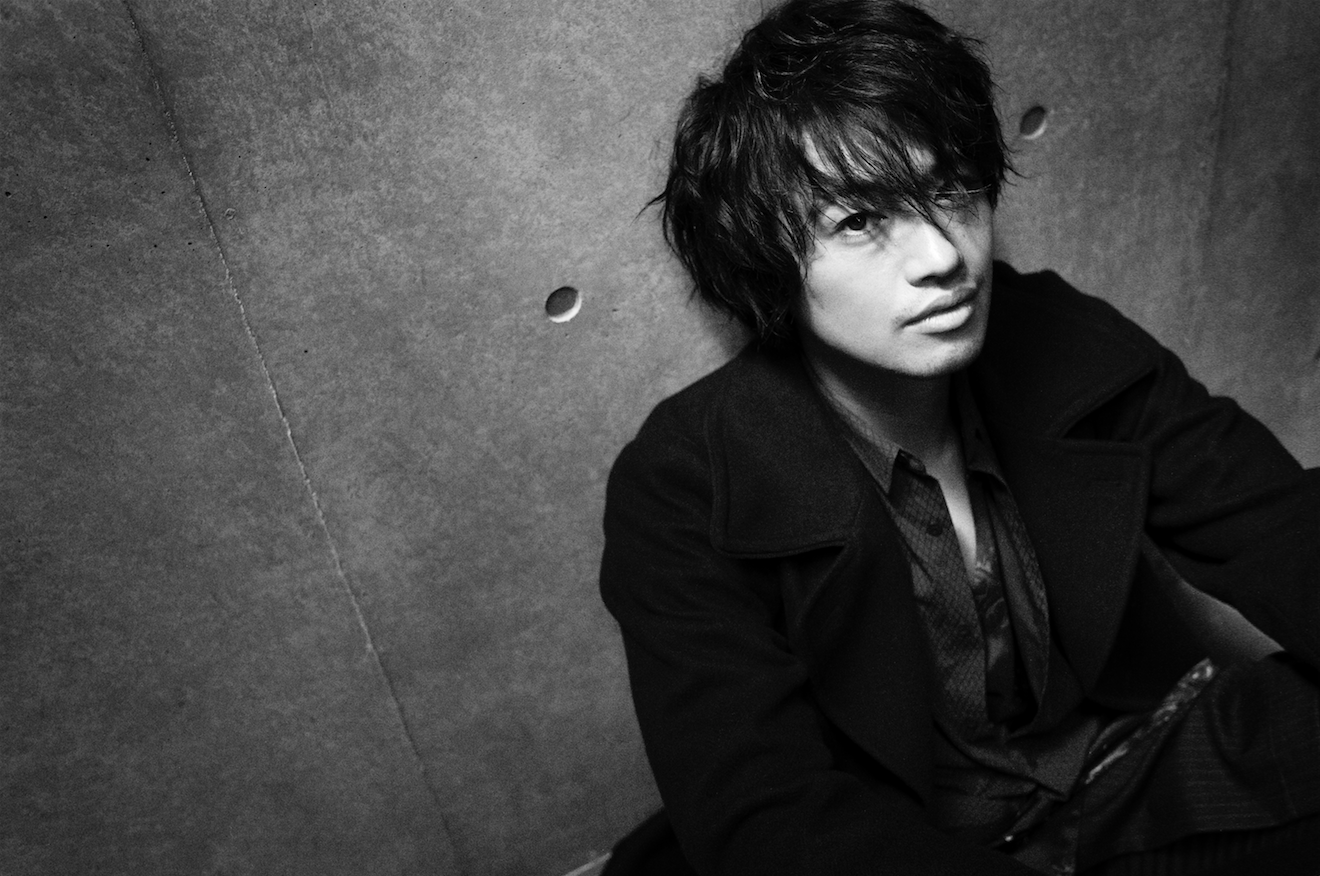
Takumi Saitoh. Photo by Mika Ninagawa
It’s because of these restrictions that actor Yusuke Iseya has chosen to manage himself. He runs a multi-faceted business that focuses on sustainable development called The Rebirth Project; however, he believes that wouldn’t be possible if a company were running his affairs.
Japanese Actors’ Lives Are Rarely Their Own
“In Hollywood, actors pay fees to their agents, and then have a degree of freedom,” Iseya told us in 2013. “Here, management agencies have the control and feel like they’re the ones who ‘created’ these stars. Most celebrities receive salaries and consequently must do whatever they’re told. Many get fame from a young age because of their looks, but then when they reach their 40s or 50s they have no identity as everything’s been done for them. It means they can’t freely take part in charity activities like, say Angelina [Jolie] does in America. It’s different for me as I’m my own boss.”
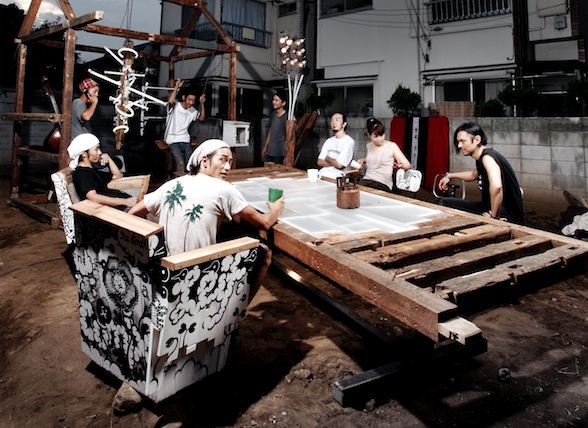
Yusuke Iseya (front) and friends
Being an established name in the industry certainly helps. For up-and-coming artists things aren’t so straightforward. Twenty-six-year-old actress Nanami is currently going it alone and has managed to find semi-regular work in various theater productions and musicals while also playing key roles in movies such as “Outer Man” and “Hold my Hand.” Eventually, though, in order to get parts she really covets she knows she’ll probably have to sign with an agency.
“I’ve spoken to people about the possibility of continuing to manage myself, but the response is always the same: You’ll need to work with an office if you want to get to the next level,” she says. “I signed for an agency after returning from LA (where she studied acting for four years), and at the first meeting with my representative I spoke about my hopes, which were quite ambitious. He looked at me as if I were talking nonsense and said ‘it’s impossible.’ I know it’s important to stay grounded, but that was really demoralizing to hear.
“I quickly realized that many agencies have a path set out for you and anyone who steps away from that, even just a little bit, is frowned upon. You’re not allowed to be proactive and find your own auditions or turn down what’s offered. They set the agenda and you have to follow.”
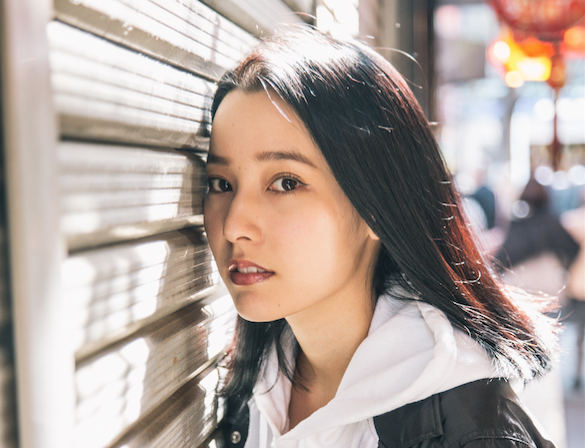
Nanami. Photo by Ken Hirama
The Loveless Lives of Japanese Musicians
In the Japanese music industry the restrictions are known to be even more severe. At a Tokyo Bridal Festival in 2010 Tomomi Itano – a popular singer at the time with the all-female group AKB48 – revealed that she wasn’t allowed to look for a boyfriend as it went against company policy. Three years later fellow member Minami Minegishi was forced to make a public apology after pictures of her leaving her partner’s apartment were published in a tabloid newspaper. As an act of contrition she shaved her head in a video viewed by millions on YouTube (bit.ly/TWMinegishi).
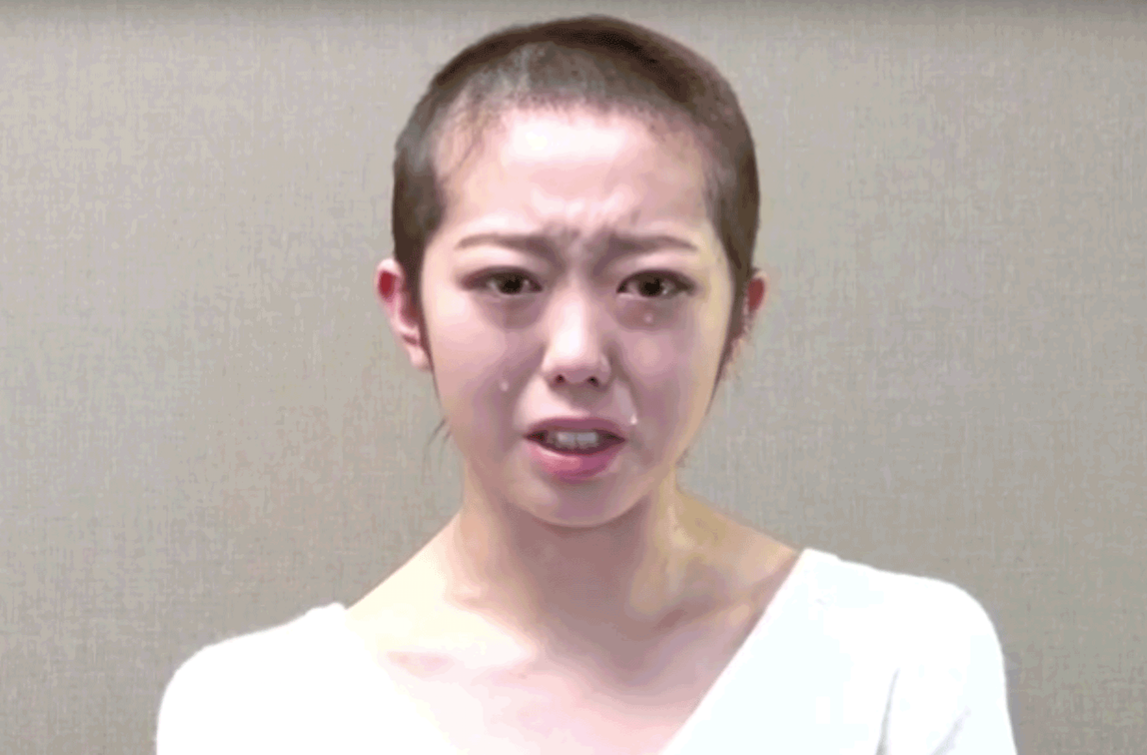
Minami Minegishi’s tearful apology drew millions of hits on YouTube
The no dating rule doesn’t just apply to idols from AKB48. In 2014 Miho Yuki and Sena Miura were fired from the group Aoyama Saint Hachamecha High School because they were going out with fans. A lawsuit for over ¥8.2 million was filed as a result. Another unnamed agency sought an amount of ¥9.9 million in damages from a client because the (also unnamed) star was in a relationship with a fan. Judge Katsuya Hara dismissed the claim, however, stating, “the enrichment of one’s life that comes from association with the opposite sex is covered under the right of self-determination … prohibiting such associations is going too far.”
Not all judges feel the same, though. Last year Tokyo District Court Judge Akimoto Kojima ordered a former idol to pay ¥650,000 to her ex-company because she had an illicit liaison with a member of the public. “In order to secure the financial support of male fans, a clause prohibiting relationships was necessary,” he said.
Johnny Kitagawa: Japan’s Showbiz Godfather
The fact is celebrities are more marketable when they’re single. A day after actor and singer Masaharu Fukuyama announced his marriage to actress Kazue Fukiishi, the stock price of his company, Amuse, fell by 8.3%, roughly a four billion yen loss in just 24 hours. This kind of situation is a major concern for all talent agencies including the country’s most powerful organization, Johnny & Associates.
The famed corporation, which represents only male artists, doesn’t ban its members from dating, but it clearly keeps a degree of control over who they can and can’t see and what age they should think about settling down. Last year Arashi’s Satoshi Ohno was forced to apologize to fans when rumors that he had a live-in girlfriend surfaced. He denied it and promised to never see her again, keeping up the façade that he’s young, free and available. Unsurprisingly, marriage is also discouraged. According to the weekly magazine Shukan Bunshun, when an idol from Johnny’s announces he wants to tie the knot, his manager will arrange a meeting to show him statistics on how much his popularity will decline if he goes through with it. Many subsequently change their minds.
For head honcho Johnny Kitagawa it’s all about maintaining power. While his clients may be seen as superstars in the eyes of their followers, within the company they’re simply employees working under tight restrictions. They’ve no rights to their music and therefore receive no royalties. They’re not allowed to receive gifts from fans and are banned from engaging with them on SNS. This tight rein of control also stretches to the press. Criticism is not tolerated and could lose media outlets access to the agency’s biggest names. It’s a price most aren’t prepared to pay.
The Culture of Harassment in Japanese Showbusiness
One of the few exceptions is Shukan Bunshun. In 1999, the weekly magazine published a 10-part series accusing Kitagawa of sexually abusing young boys who’d previously worked for him. The story was based on the accounts of 12 minors, including one 12-year-old, who all spoke on condition of anonymity. Similar allegations had previously been made by former idols Junya Hiramoto and the late Koji Kita (Four Leaves). The music mogul denied everything and decided to sue the magazine for defamation of character on eight counts. The lower court ruled in his favor on four, ordering Bunshun to pay him ¥8.8 million. The high court then reversed the decision relating to the sexual exploitation of adolescents, reducing the penalty to ¥1.2 million.
Kitagawa managed to avoid a criminal investigation as the statute of limitations had passed; however, it was a significant victory for Bunshun and an expose as big as the 2012 Jimmy Saville sexual abuse scandal in the UK. You’d have expected it to have been on the front page of every newspaper in the country, yet not one word was written or spoken about it by the Japanese media.
Turning a blind eye to the iniquitous goings-on of a talent agency is all too common in Japan. In 2013 Miss International, Ikumi Yoshimatsu, spoke to both domestic and international reporters about the actions of a top executive at the high-profile agency K-Dash, alleging that he’d harassed, threatened and stalked her after she’d refused to join the company due to concerns over their links with the yakuza. The story was widely covered by the foreign press, but once again ignored by journalists here. Disillusioned by the way she was treated, Yoshimatsu decided to move to America.
“Starting work in the US was like emerging out of the dark ages into the light,” the 29-year-old recently told Weekender. “You have retirement funds, health cover and actors’ unions protecting workers’ rights. Clients have various agents representing them in different areas like theater and TV. These agents work on a commission basis and are regulated by laws. It allows for complete autonomy and self-control of your own career. You can make a change should you feel one member’s not representing you well enough.”
“In Japan, once a shady agency with ties to organized crime declares ‘ownership’ over an individual, either with or without a proper contract, nobody else in the small Japanese entertainment industry will work with that person out of fear of what may be ‘attached’ to them. For women here, stories of forced prostitution in order to work regularly echo throughout society. Then when a ‘talent’ outlives their usefulness they’re often thrown out with no money, no retirement package and no benefits of any kind.”
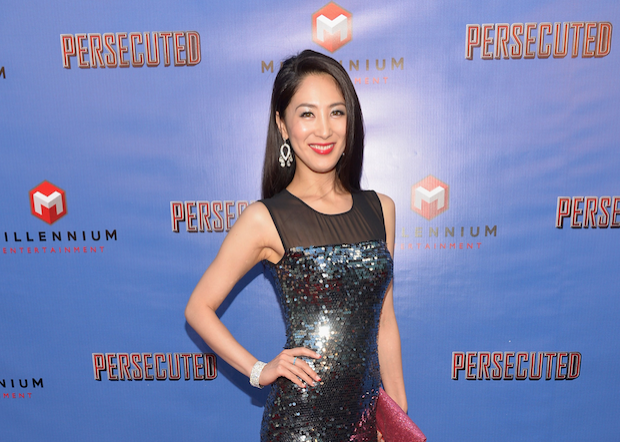
Izumi Yoshimatsu. Photo by Michael Tullberg/Getty Images
A Few Good Agencies
Whilst very critical of the Japanese system in general, Yoshimatsu was keen not to paint everyone with the same brush, stating that were “some great agencies in Japan doing a good job of representing their clients.” Sky Corporation claims to be one of those agencies. Fumiko Honma, head of the organization that looks after stars like Sumire, Kiki Sukezane and Junichi Ishida, told us she only had the interests of her clients at heart.
“At this office we look for the kind of jobs our artists want to do then leave it up to them to decide,” she said. “Of course we’ll offer advice, but we certainly won’t demand that they take this or turn that down. It’s important they have no regrets.”
It’s the kind of comment you’d expect to hear from every talent agency, yet far too many continue to treat their clients like pieces of meat. Of course this won’t stop people signing for them as these companies provide a gateway to a world of fame and fortune. It’s a world Nanami would like to be part of; however, she’s not prepared to sacrifice her own freedom and integrity in order to get there.
“Being without an agency is probably hindering my chances of getting auditions right now, but I can’t afford to rush in and sign with the first one that makes me an offer,” she says. “I understand why people do; it’s very tempting. For me, though, the conditions have to be right so I’m doing lots of research. If you’re going to join a company you need to know its background fully before you join, otherwise you could end up ruing your decision for the rest of your career.”
This feature appears in the November 2016 issue of Tokyo Weekender magazine.




